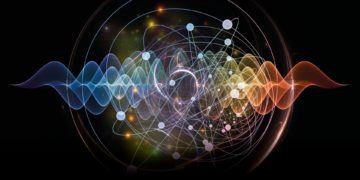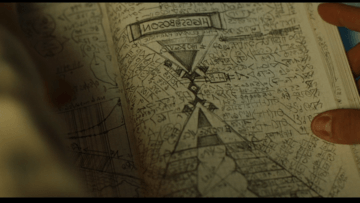by Jochen Szangolies

Hearing the words ‘quantum mechanics’ usually invokes images of the impossibly tiny and fleeting, phenomena just barely on the edge of existence, unfathomably far removed from everyday experience. Perhaps illustrated in the form of bright, jittery sparkly things jumping about in a PBS documentary, perhaps as amorphous, hovering blobs of improbability, perhaps, sometimes, by the confounding notion of a cat that’s somehow both dead and alive, yet neither of those.
This does the subject a disservice. It paints a picture of quantum mechanics as far removed from everyday experience, as something we need not worry about in everyday life, something for boffins in lab-coats to contend with in their arcane ways. Yet, we’re told of the fantastic properties of the quantum world: particles that can be in two places at once, or spontaneously erupt out of sheer nothingness; that can jump through walls and communicate with one another across great distances instantly; that seem to know when they’re being watched; that are somehow both wave and particle; and so on.
Quantum reality, then, is at once beyond our grasp and, apparently, a source of fantastical properties. This combination has always marked the arena of the mystical: something just out of reach, something fundamentally unknowable, that, nevertheless, holds the promise of opening the doors to a strange, new world—to powers far beyond those the mundane world holds in store. The quantum world is a hidden world, and, like other hidden worlds throughout history, access to it becomes a coveted resource—to the profit of those purporting to be able to grant it.
Hence, ‘quantum’ has become the buzzword of a new generation of woo-peddlers, charlatans of the same sort that used to claim to be able to speak with gods, ghosts, or demons, to know the future by interpreting the stars, or to craft spells to help you and hurt your enemies. All of these are fueled by hidden worlds, access to which is granted to only the chosen few: the spiritual realm, the supralunar sphere in which the planets trace their course, the reality ‘beyond the veil’ or, of course, the ultimate hidden world of all—the future.
In earlier times, this gave us love potions, prophecies, miracle workers, and literal snake oil (not that these aren’t still around, in one form or another)—today, it gives us quantum healing, quantum jumping, and What the Bleep Do We Know!?.
This might seem mostly innocuous. We all have people in our lives who subscribe to odd beliefs—and indeed, more likely than not, we harbor some ourselves. But while many of these could be construed as fostering perhaps strange, but ultimately harmless ‘feel-good’ beliefs (as well as funneling some coins into the pockets of their purveyors), the same sort of phenomenon has also brought us religious persecution and the witch-hunts of the Spanish Inquisition: the collision of hidden worlds has real-world aftershocks.
Is Science a Hidden World?
Hidden worlds are characterized by the way they are closed off from everyday experience, and by the (supposedly) ‘other-worldly’ abilities they can bestow upon those with the means to access them. On the face of it, this seems an apt characterization of science as such: only comparatively few people have access to its ‘secrets’, but those that do are responsible for the creation of numerous wonders—from X-ray machines that permit us to look at the innermost workings of our bodies, to television sets that open up vistas to distant or even fictional worlds, to computers, the internet, lasers, holograms, artificially intelligent virtual assistants we carry around in our back pockets. All of these, conjured up in earlier times, would surely have been sufficient proof of magic, or the favor of the gods.
Indeed, as astrophysicist and iconic science communicator Carl Sagan put it, ‘any sufficiently advanced technology is indistinguishable from magic’. The flip side of this is, of course: perhaps what seems magical to us, now, is just technology, or science, we don’t understand yet? Or perhaps, there are those who do understand, but their understanding has not yet percolated through into the mainstream? Didn’t they (whoever ‘they’ are) laugh at Einstein, too?

In short, one might be forgiven for conflating the often opaque, and sometimes exceedingly obfuscated, realm of scientific discovery with the deliberately occult machinations of those purporting to control access to a hidden world of whatever stripe. Both often make use of forbidding formalism and highly specialized language, require access to hard to obtain resources, and rely on difficult to master skills for their practice. Both, then, divide the world into adepts and amateurs, into the initiated and the ignorant.
Thus, it seems that the boundary between science and pseudoscience is fluid—and indeed, the more difficult the hurdle of initiation into the scientific arcana becomes, the farther removed from everyday experience the field appears, the more its boundaries blur.
How to tell the difference between proper science and that which only seeks to feign legitimacy by cloaking itself in scientific trappings is a well-worn philosophical issue, the so-called ‘demarcation problem’. A seductively easy answer is that science works—a rain-dance may or may not be followed by much-needed irrigation, but turning on the TV reliably delivers tomorrow’s weather forecast to your living room.
But this is clearly too glib. Not all aspects of scientific inquiry have an immediate, or even long-term, practical application; that doesn’t mean they’re not ‘proper science’. Furthermore, the ability to build impressive gadgets is a nice spin-off, but it’s not why we do it—science, the process of discovery, the furthering of human knowledge, is its own end. The commoditization that is entailed by construing science as delineated by its mere capability to create useful artifacts is antithetical to science as the pursuit of understanding.
Finally, such a criterion is ultimately circular: how do we figure out what works and what doesn’t? Millions are convinced that solutions of water containing, on average, not a single molecule of a putative active agent still have healing powers. To debunk such claims, sustained study and analysis is necessary—in other words, the question of whether something works is, often enough, itself subject to scientific inquiry.
The perhaps most widely publicized candidate for a delineation between science and non-science is the notion of falsifiability, due to the philosopher Karl Popper. A scientifically respectable statement, the story goes, is one such that it is in principle amenable to being shown wrong—that is, each scientific hypothesis must carry within itself the possibility of its own unmaking.

There is considerable logical force to the idea, but the criterion often flounders in reality. Human investigation is far from perfect; any single observation can itself be erroneous. Hence, casting out decades of research on the basis of a single contradictory data-point may be ill-advised. Data are not clear, pristine revelations of truth, but must be carefully weighed, and that process of weighting itself is subject to current scientific understanding—all experiment is theory-laden. Furthermore, theories are complex things. In the face of conflicting data, what part of a theory should you consider repudiated?
Falsifiability does not provide the unambiguous dividing line we may have hoped for (and a fetishistic belief to the contrary may itself be detrimental to progress). But then again, maybe this isn’t so terrible. Not everything needs a sharp and clear delineation—science is a human endeavor among many, and many aspects of human lived experience don’t seem to abide by a clear, sharp definition, but are rather more subject to a kind of ‘I know it when I see it’ recognition (as discussed recently regarding the concept of knowledge).
But even if there is no clear way of picking out science as opposed to non-science, I think there is something that sets the world of science apart from the hidden worlds discussed above: it is, in principle if not always in practice, open to all. The gatekeepers of the hidden worlds keep their secrets, because it is only through them that they secure their power; but science, I will argue, is only properly scientific if it is shared, if its gates are wide, and its fruits shared by all. That is why scientists have done themselves and their subject a disservice by expelling the quantum from everyday reality, by making the quantum world a hidden world, and thus, ripe for exploitation by hucksters and con-artists.
Note that I am not suggesting that ‘openness’ suffices to delineate scientific knowledge. Knowledge of the latest exploits of the Kardashian clan is excruciatingly open to all of us, but hardly scientific. Nor am I suggesting that all worthwhile or valuable knowledge must be open—much less scientific: knowledge of your experience of joy upon listening to a beloved piece of jazz music may forever be closed off from me, but that should not diminish its importance to you. But I do think that openness—the availability for consensus-building—is a necessary characteristic of scientific knowledge: if it’s not open, it’s not properly scientific.
Quantum every day
Consider the mug of coffee placed upon your desk. The fact that it remains there is explicable exclusively thanks to quantum theory: the Pauli exclusion principle entails that fermionic (matter) particles can’t be in exactly the same state, which is ultimately what keeps matter from collapsing, as shown by Freeman Dyson and Andrew Lenard in the 1960s.
Many other everyday phenomena are explicable only in a quantum context: the fact that a ray of light takes the path that minimizes its travel time (or more generally, the principle of least action, which governs the dynamics of physical systems), the fact that your heater doesn’t spontaneously explode, or of course, many of our most familiar technologies, like the transistors in your computer’s processor, or the OLED display of your smartphone. It has even been proposed that the sense of smell relies on quantum effects: far from being removed, or hidden, from our everyday experience, the quantum world is our everyday experience.
Why, then, have scientists failed at bringing the understanding of the quantum into the everyday realm where it belongs? Again, there’s a seductive, but wrong, answer: because it’s really, really complicated. Of course, it is really complicated: but lots of things are. I have only the vaguest notion of how my computer, or my smartphone, or even my car works: but that doesn’t lead me to consider their working mysterious. I know there are definite principles at work that reliably produce desired effects, such as my car starting up when I turn the key, and accelerating when I press down the right pedal, even if I may not know what, precisely, those principles are, and how they operate. I am comfortable with my ignorance, in this case; why shouldn’t I be equally comfortable with not knowing how a particle could be both a wave and a particle? Why should that lead me to believe that there’s a hidden world within the quantum that bestows, say, mysterious healing powers upon those that can access it?
I believe the answer to this lies, at least in part, with the fact that we, as scientists, have failed to open up the field of quantum mechanics to the wider public. Within the limits of my own capabilities, I could conceivably become an expert on how cars operate—there is no essential mystery there. I could learn how to take them apart, and put them back together: the world of car maintenance is, in principle, open to me, should I be willing to invest the necessary time and sweat into becoming an expert. Thus, the difference between me and the mechanic is just that they have done so, and I didn’t; the fact that they have done this work, so that I don’t have to, is ultimately the reason I pay them for their services.
The huckster, on the other hand, must operate on a principle that I couldn’t obtain what they have for myself—because of course, ultimately, they don’t have anything. The only secret to be found in purported hidden worlds is that there’s nothing there. Hence, it is just their hiddenness that can be appealed to, by means of legitimizing their claim for compensation. The medium that claims access to the spirit world is only able to do so by means of possessing ‘the gift’; I, lacking it, must take their pronouncements on faith.
In contrast, then, there can be nothing hidden in science. Scientific knowledge, to be properly so-called, must, at least in principle, be capable of becoming common knowledge. Sure, just like I, no matter how much I applied myself, might never make a good mechanic, not every individual is equally well suited to doing science. Not everyone needs to be, much less wants to be. But I’m not arguing that scientific knowledge should be equally accessible to each and everyone, but rather, that it should be in principle shareable, and open to being shared.
(As a corollary, this means that discrimination, and a lack of diversity, in science, is not just an ethical flaw in its organization, it’s antithetical to the pursuit of science itself, because it diminishes its openness: the teacher discouraging girls from pursuing their interest in science is, ultimately, no different from the fraud claiming a special connection to the spirit world.)
But the popular image of quantum mechanics is a different one. It is portrayed, not just as a subject that is difficult to master (which it certainly is), where several key questions still await answers (which they certainly do), but rather, as one of intrinsic and ineluctable mystery. Its central phenomena are portrayed as strange and unfathomable, and thus, those that contend with them on a daily basis, must by some strange power be able to fathom the unfathomable.

It’s true, much is still unknown about the quantum world. But there are open questions in other areas of science, which do not attract the same level of mysticism as the quantum world does. Werner Heisenberg, one of the principal architects of quantum mechanics, reportedly said: “When I meet God, I am going to ask him two questions: Why relativity? And why turbulence? I really believe he will have an answer for the first.” And yet, there are no self-help books about how to achieve inner balance by really vigorously stirring the milk into your coffee (to my knowledge). The mere fact that problems are unsolved does not mean that they are necessarily mysterious.
So what is it, then, that makes the quantum special? That has prompted scientists to hide it, in the impossibly small and delicate, rather than putting it right next to the cup of coffee on your desk, where it belongs?
There are many unique challenges posed by quantum mechanics. The uncertain role of measurement; the appearance of a probabilistic description; the phenomenon of superposition; and so on. But I think that there’s a different, far more human effect at work here.
Over the last few centuries, science has, in many circles, come to be regarded as the royal road to truth. And it’s here that quantum mechanics throws a spanner in the works: while there is a perfectly successful formalism of unparalleled predictive power, in the end, embarrassingly, we don’t really know what it means—we don’t know the physics behind the description, so to speak. With turbulence, we know what happens, but we don’t know how to describe it; with quantum mechanics, we know how to describe it, but we don’t really know what’s going on.
There are two ways forward from this situation, to open up the gates to the hidden world of the quantum, as far as I can see. One is to try and figure out what’s going on. This is something I’ve spent a fair amount of time trying to do, and I’d like to think not entirely without success.
However, there’s of course no guarantee that these efforts will succeed—not now, and perhaps not ever. There might be things we’re not smart enough to figure out, and there might even be things that can’t be figured out. If so, then we must be prepared to re-evaluate the role of science—to free scientists from the burden of being purveyors of capital-T Truth, and instead, acknowledge science as one among many human endeavors, as flawed and varied as the humans pursuing it.
Thus freed, there is no embarrassment in saying, we don’t know, and maybe we can’t know. There is no impetus to hide perceived lacunae in remote areas of human experiences. And then, there is no opening for those who would exploit such hidden worlds for their own gain.
